ENEG20001 Australian Engineering Practice: Learning Outcomes 6 & 7
VerifiedAdded on 2023/06/15
|5
|1062
|204
Report
AI Summary
This report provides a reflection on the learning outcomes of an Australian Engineering Practice course, specifically addressing teamwork, collaboration, self-review, self-management, and lifelong learning. The student reflects on their understanding of collaboration, highlighting the importance of belonging, sharing, respect, and trust, drawing from experiences as a sports captain. They identify areas for improvement, including creativity, problem-solving skills, and analytical aptitude. The report also discusses time management strategies and outlines a career plan, emphasizing the need to develop technical, interpersonal, and problem-solving skills. The student references the textbook "The Making of an Expert Engineer" by James P. Trevelyan to support their reflections on the significance of collaboration in project teams.
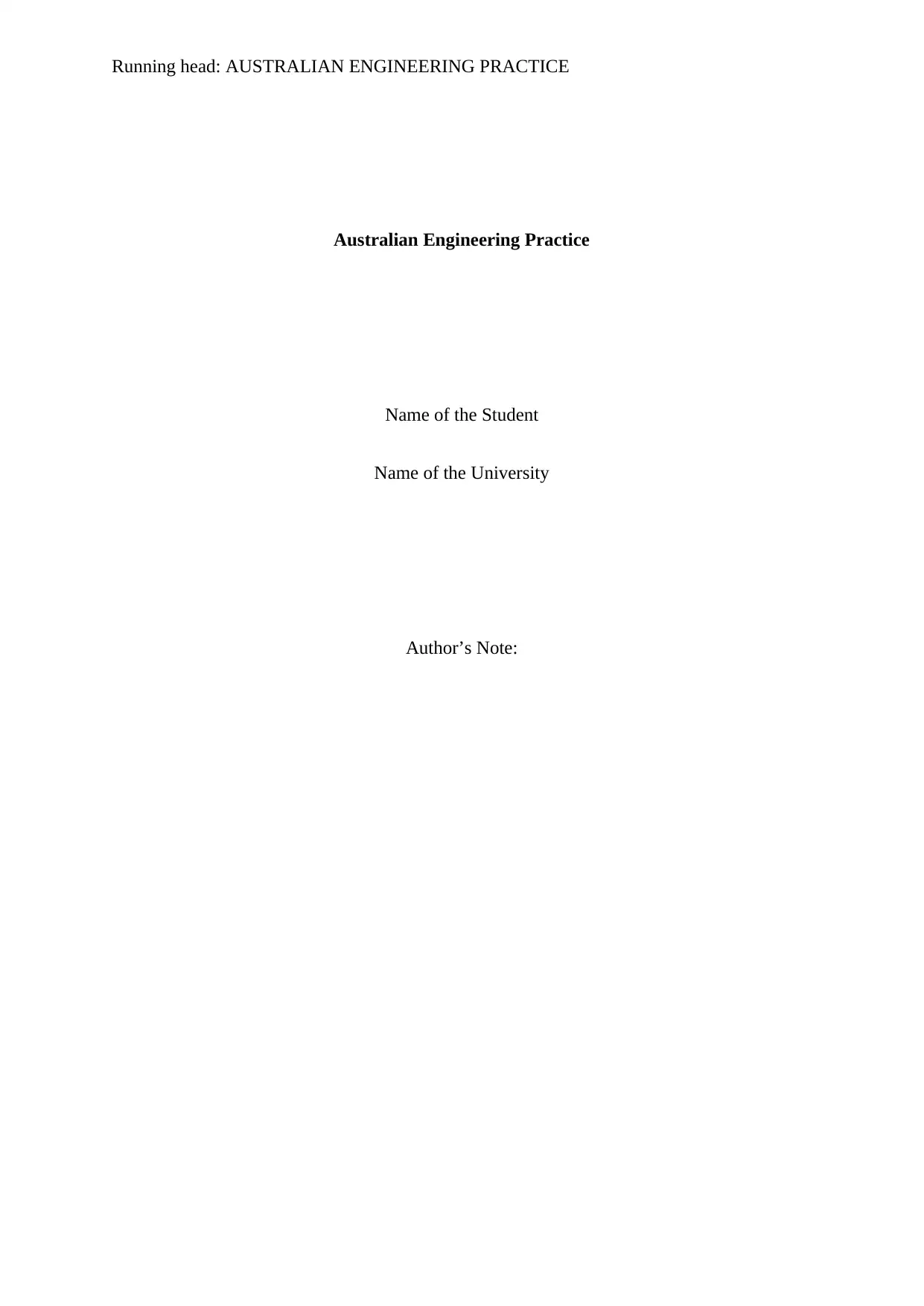
Running head: AUSTRALIAN ENGINEERING PRACTICE
Australian Engineering Practice
Name of the Student
Name of the University
Author’s Note:
Australian Engineering Practice
Name of the Student
Name of the University
Author’s Note:
Paraphrase This Document
Need a fresh take? Get an instant paraphrase of this document with our AI Paraphraser
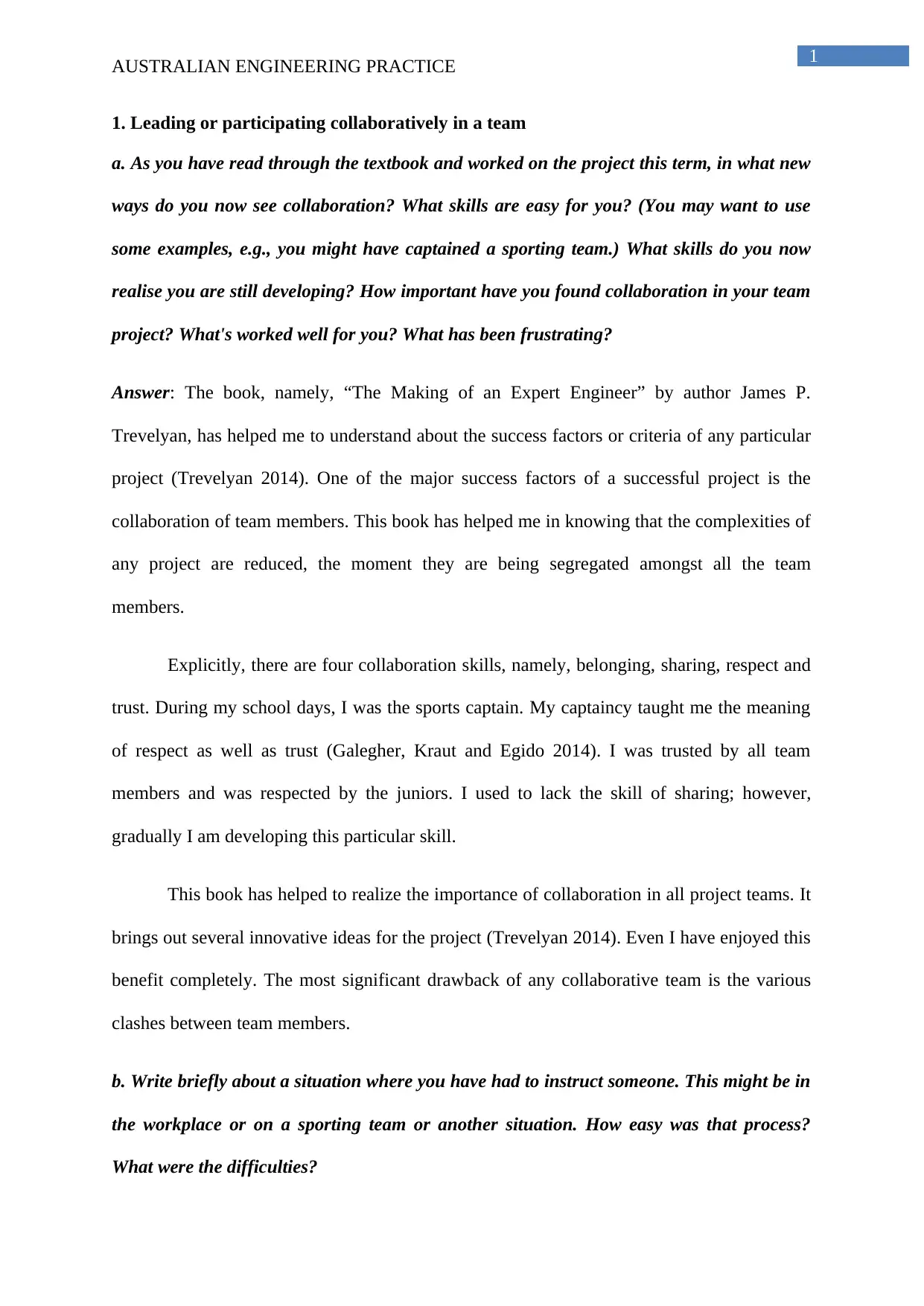
1
AUSTRALIAN ENGINEERING PRACTICE
1. Leading or participating collaboratively in a team
a. As you have read through the textbook and worked on the project this term, in what new
ways do you now see collaboration? What skills are easy for you? (You may want to use
some examples, e.g., you might have captained a sporting team.) What skills do you now
realise you are still developing? How important have you found collaboration in your team
project? What's worked well for you? What has been frustrating?
Answer: The book, namely, “The Making of an Expert Engineer” by author James P.
Trevelyan, has helped me to understand about the success factors or criteria of any particular
project (Trevelyan 2014). One of the major success factors of a successful project is the
collaboration of team members. This book has helped me in knowing that the complexities of
any project are reduced, the moment they are being segregated amongst all the team
members.
Explicitly, there are four collaboration skills, namely, belonging, sharing, respect and
trust. During my school days, I was the sports captain. My captaincy taught me the meaning
of respect as well as trust (Galegher, Kraut and Egido 2014). I was trusted by all team
members and was respected by the juniors. I used to lack the skill of sharing; however,
gradually I am developing this particular skill.
This book has helped to realize the importance of collaboration in all project teams. It
brings out several innovative ideas for the project (Trevelyan 2014). Even I have enjoyed this
benefit completely. The most significant drawback of any collaborative team is the various
clashes between team members.
b. Write briefly about a situation where you have had to instruct someone. This might be in
the workplace or on a sporting team or another situation. How easy was that process?
What were the difficulties?
AUSTRALIAN ENGINEERING PRACTICE
1. Leading or participating collaboratively in a team
a. As you have read through the textbook and worked on the project this term, in what new
ways do you now see collaboration? What skills are easy for you? (You may want to use
some examples, e.g., you might have captained a sporting team.) What skills do you now
realise you are still developing? How important have you found collaboration in your team
project? What's worked well for you? What has been frustrating?
Answer: The book, namely, “The Making of an Expert Engineer” by author James P.
Trevelyan, has helped me to understand about the success factors or criteria of any particular
project (Trevelyan 2014). One of the major success factors of a successful project is the
collaboration of team members. This book has helped me in knowing that the complexities of
any project are reduced, the moment they are being segregated amongst all the team
members.
Explicitly, there are four collaboration skills, namely, belonging, sharing, respect and
trust. During my school days, I was the sports captain. My captaincy taught me the meaning
of respect as well as trust (Galegher, Kraut and Egido 2014). I was trusted by all team
members and was respected by the juniors. I used to lack the skill of sharing; however,
gradually I am developing this particular skill.
This book has helped to realize the importance of collaboration in all project teams. It
brings out several innovative ideas for the project (Trevelyan 2014). Even I have enjoyed this
benefit completely. The most significant drawback of any collaborative team is the various
clashes between team members.
b. Write briefly about a situation where you have had to instruct someone. This might be in
the workplace or on a sporting team or another situation. How easy was that process?
What were the difficulties?
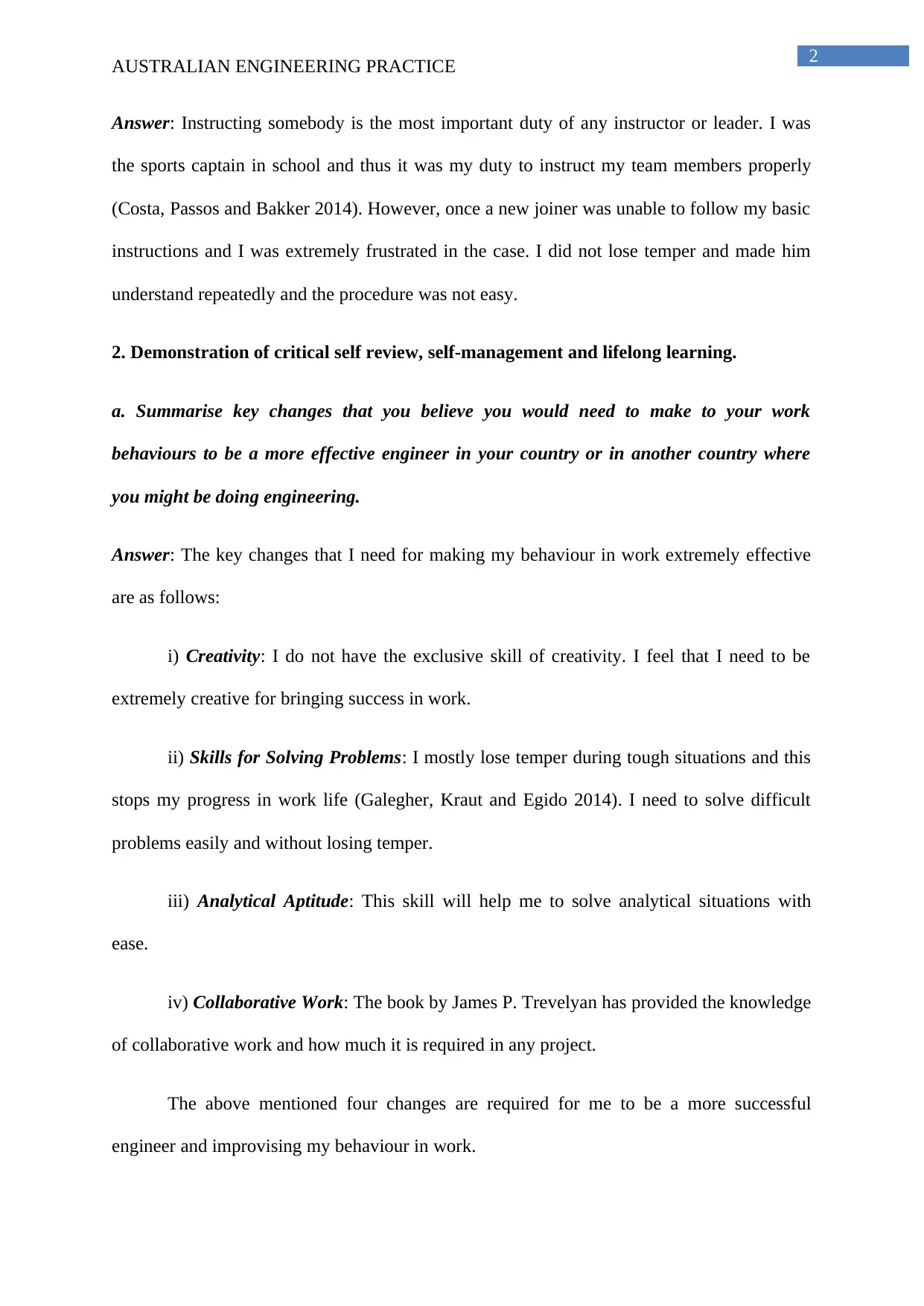
2
AUSTRALIAN ENGINEERING PRACTICE
Answer: Instructing somebody is the most important duty of any instructor or leader. I was
the sports captain in school and thus it was my duty to instruct my team members properly
(Costa, Passos and Bakker 2014). However, once a new joiner was unable to follow my basic
instructions and I was extremely frustrated in the case. I did not lose temper and made him
understand repeatedly and the procedure was not easy.
2. Demonstration of critical self review, self-management and lifelong learning.
a. Summarise key changes that you believe you would need to make to your work
behaviours to be a more effective engineer in your country or in another country where
you might be doing engineering.
Answer: The key changes that I need for making my behaviour in work extremely effective
are as follows:
i) Creativity: I do not have the exclusive skill of creativity. I feel that I need to be
extremely creative for bringing success in work.
ii) Skills for Solving Problems: I mostly lose temper during tough situations and this
stops my progress in work life (Galegher, Kraut and Egido 2014). I need to solve difficult
problems easily and without losing temper.
iii) Analytical Aptitude: This skill will help me to solve analytical situations with
ease.
iv) Collaborative Work: The book by James P. Trevelyan has provided the knowledge
of collaborative work and how much it is required in any project.
The above mentioned four changes are required for me to be a more successful
engineer and improvising my behaviour in work.
AUSTRALIAN ENGINEERING PRACTICE
Answer: Instructing somebody is the most important duty of any instructor or leader. I was
the sports captain in school and thus it was my duty to instruct my team members properly
(Costa, Passos and Bakker 2014). However, once a new joiner was unable to follow my basic
instructions and I was extremely frustrated in the case. I did not lose temper and made him
understand repeatedly and the procedure was not easy.
2. Demonstration of critical self review, self-management and lifelong learning.
a. Summarise key changes that you believe you would need to make to your work
behaviours to be a more effective engineer in your country or in another country where
you might be doing engineering.
Answer: The key changes that I need for making my behaviour in work extremely effective
are as follows:
i) Creativity: I do not have the exclusive skill of creativity. I feel that I need to be
extremely creative for bringing success in work.
ii) Skills for Solving Problems: I mostly lose temper during tough situations and this
stops my progress in work life (Galegher, Kraut and Egido 2014). I need to solve difficult
problems easily and without losing temper.
iii) Analytical Aptitude: This skill will help me to solve analytical situations with
ease.
iv) Collaborative Work: The book by James P. Trevelyan has provided the knowledge
of collaborative work and how much it is required in any project.
The above mentioned four changes are required for me to be a more successful
engineer and improvising my behaviour in work.
⊘ This is a preview!⊘
Do you want full access?
Subscribe today to unlock all pages.

Trusted by 1+ million students worldwide
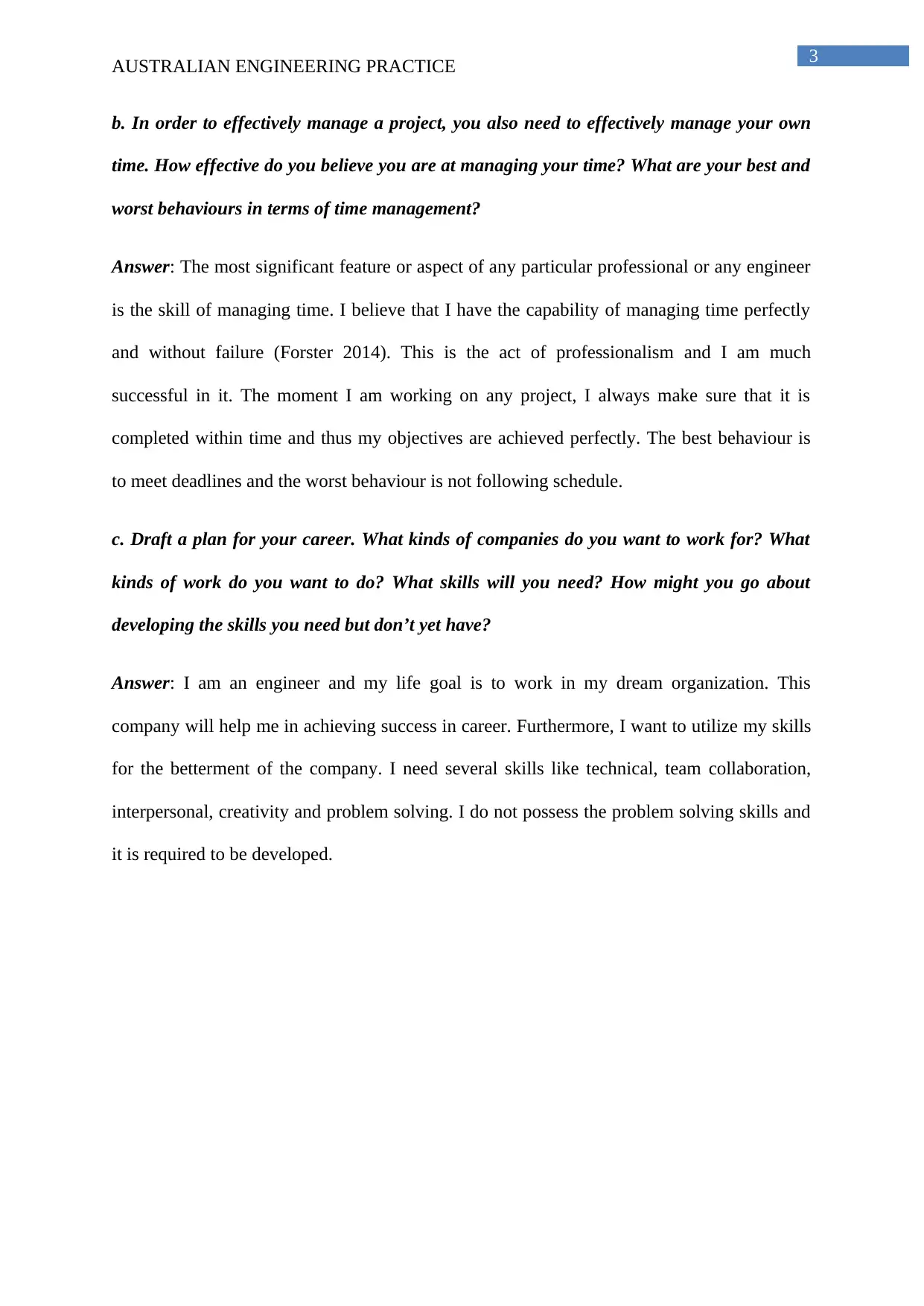
3
AUSTRALIAN ENGINEERING PRACTICE
b. In order to effectively manage a project, you also need to effectively manage your own
time. How effective do you believe you are at managing your time? What are your best and
worst behaviours in terms of time management?
Answer: The most significant feature or aspect of any particular professional or any engineer
is the skill of managing time. I believe that I have the capability of managing time perfectly
and without failure (Forster 2014). This is the act of professionalism and I am much
successful in it. The moment I am working on any project, I always make sure that it is
completed within time and thus my objectives are achieved perfectly. The best behaviour is
to meet deadlines and the worst behaviour is not following schedule.
c. Draft a plan for your career. What kinds of companies do you want to work for? What
kinds of work do you want to do? What skills will you need? How might you go about
developing the skills you need but don’t yet have?
Answer: I am an engineer and my life goal is to work in my dream organization. This
company will help me in achieving success in career. Furthermore, I want to utilize my skills
for the betterment of the company. I need several skills like technical, team collaboration,
interpersonal, creativity and problem solving. I do not possess the problem solving skills and
it is required to be developed.
AUSTRALIAN ENGINEERING PRACTICE
b. In order to effectively manage a project, you also need to effectively manage your own
time. How effective do you believe you are at managing your time? What are your best and
worst behaviours in terms of time management?
Answer: The most significant feature or aspect of any particular professional or any engineer
is the skill of managing time. I believe that I have the capability of managing time perfectly
and without failure (Forster 2014). This is the act of professionalism and I am much
successful in it. The moment I am working on any project, I always make sure that it is
completed within time and thus my objectives are achieved perfectly. The best behaviour is
to meet deadlines and the worst behaviour is not following schedule.
c. Draft a plan for your career. What kinds of companies do you want to work for? What
kinds of work do you want to do? What skills will you need? How might you go about
developing the skills you need but don’t yet have?
Answer: I am an engineer and my life goal is to work in my dream organization. This
company will help me in achieving success in career. Furthermore, I want to utilize my skills
for the betterment of the company. I need several skills like technical, team collaboration,
interpersonal, creativity and problem solving. I do not possess the problem solving skills and
it is required to be developed.
Paraphrase This Document
Need a fresh take? Get an instant paraphrase of this document with our AI Paraphraser
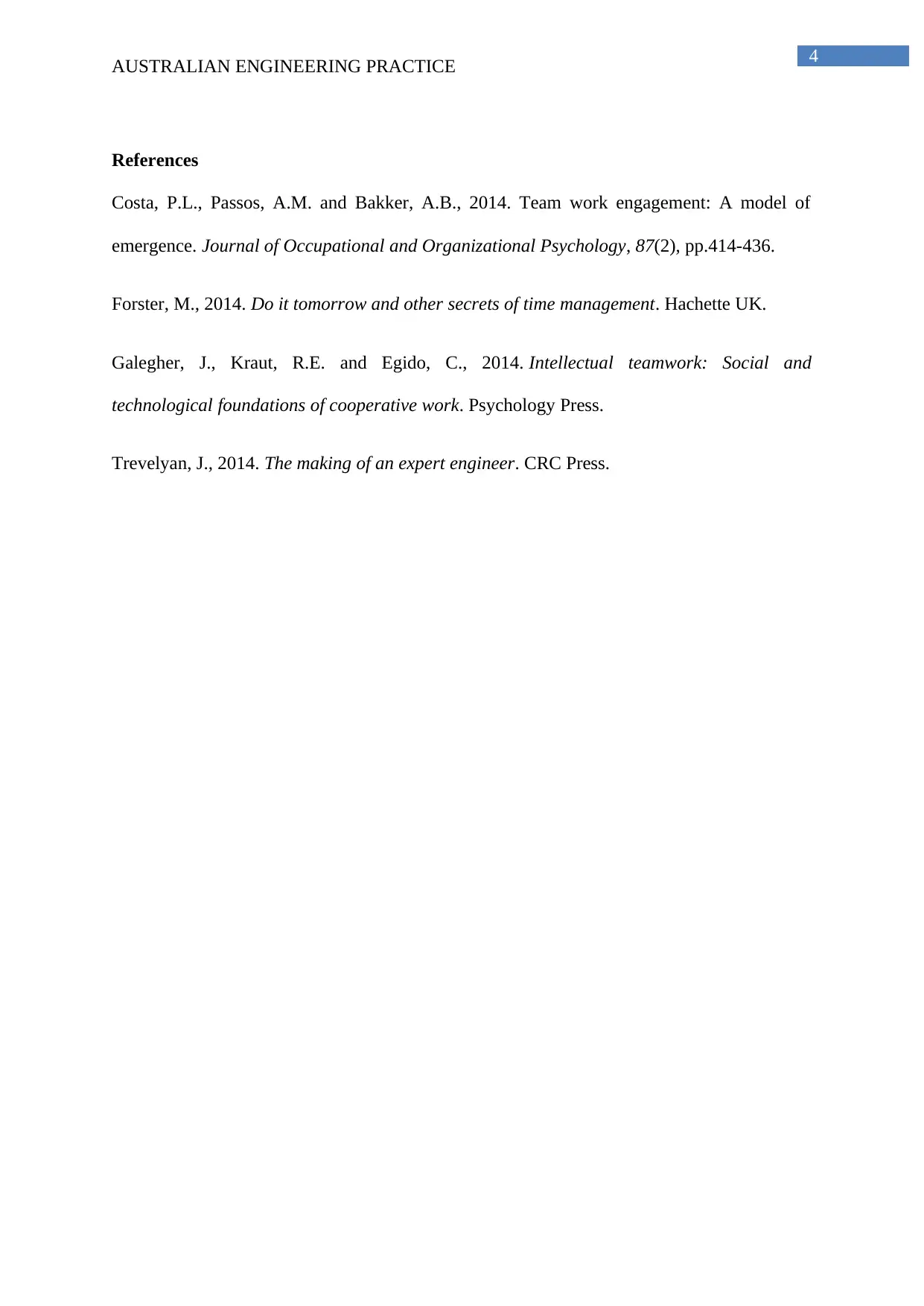
4
AUSTRALIAN ENGINEERING PRACTICE
References
Costa, P.L., Passos, A.M. and Bakker, A.B., 2014. Team work engagement: A model of
emergence. Journal of Occupational and Organizational Psychology, 87(2), pp.414-436.
Forster, M., 2014. Do it tomorrow and other secrets of time management. Hachette UK.
Galegher, J., Kraut, R.E. and Egido, C., 2014. Intellectual teamwork: Social and
technological foundations of cooperative work. Psychology Press.
Trevelyan, J., 2014. The making of an expert engineer. CRC Press.
AUSTRALIAN ENGINEERING PRACTICE
References
Costa, P.L., Passos, A.M. and Bakker, A.B., 2014. Team work engagement: A model of
emergence. Journal of Occupational and Organizational Psychology, 87(2), pp.414-436.
Forster, M., 2014. Do it tomorrow and other secrets of time management. Hachette UK.
Galegher, J., Kraut, R.E. and Egido, C., 2014. Intellectual teamwork: Social and
technological foundations of cooperative work. Psychology Press.
Trevelyan, J., 2014. The making of an expert engineer. CRC Press.
1 out of 5
Related Documents
Your All-in-One AI-Powered Toolkit for Academic Success.
+13062052269
info@desklib.com
Available 24*7 on WhatsApp / Email
![[object Object]](/_next/static/media/star-bottom.7253800d.svg)
Unlock your academic potential
Copyright © 2020–2026 A2Z Services. All Rights Reserved. Developed and managed by ZUCOL.




